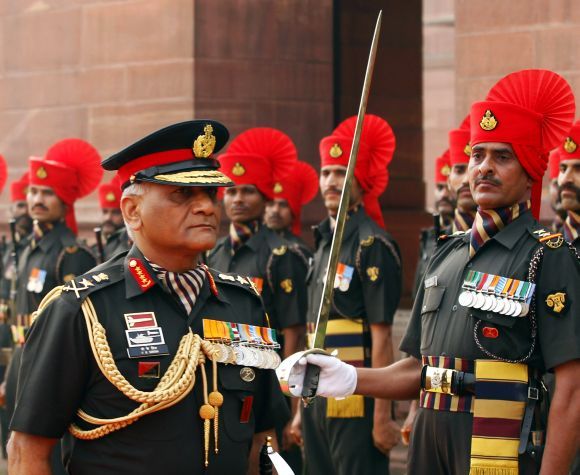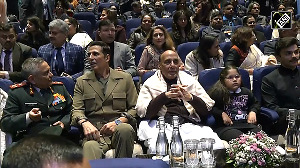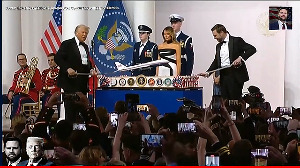'It is possible that in his perambulations from the company of Baba Ramdev to that of Anna Hazare and finally to the BJP, he hasn't had time to refurbish his memory of what he may have read earlier,' says Amulya Ganguli.

Renaming Aurangzeb Road was the easy part -- on a par with abolishing the Planning Commission.
The Mughal emperor is one of the most criticised in Indian history. Secularists have had a tough time maintaining that he also contributed for temple upkeep.
But he is remembered mostly for imposing the jizya tax on Hindus even if the secularists have been insisting that it was the dire straits of the economy and not any animus against the infidels which made him overturn the scrapping of the jizya by his great grandfather, Akbar, more than a century ago.
But abolition of the jizya or not, Akbar, too, has come under fire. The word Great attached to his name by secular historians sticks in saffron throats.
They want to take it out and add it to Maharana Pratap's name.
Among those who are advocating this step with considerable enthusiasm is former army chief V K Singh, now the minister of state for external affairs.
His chief claim to recent fame is, of course, the coinage of the phrase, 'presstitutes' to denote the media.
Unlike the unknown discoverer of the term 'sickular' for secular, V K Singh has seen to it that he will be remembered for his abuse of those belonging to the Fourth Estate.
If he can succeed in having Akbar Road in New Delhi renamed after Maharana Pratap, he will have won a great victory in the eyes of the Sangh Parivar.
His task will not be easy. Although Akbar has been under fire from other saffron notables like V S Naipaul, he still has a sterling reputation among distinguished historians, whose numbers do not include the present chairman of the Indian Council of Historical Research, the RSS appointee, Y S Rao.
For the others, Naipaul's charge that the Taj Mahal is 'so wasteful, so decadent and in the end so cruel' that the Nobel Laureate 'found it painful to be there for very long' is so much trash.
V K Singh has shown considerable courage, therefore, in leading the rabble for renaming Akbar Road since in all likelihood, he is going to fail.
After all, an act of vandalism of this nature will call for explanations from the Narendra Modi government not only from Indian historians even if they are dismissed as Nehruvian, but also foreign scholars who cannot be ignored so easily, especially now that Modi has taken to foreign tours like a duck to water.
Even if V K Singh has the backing of the RSS in his mission, what will be of interest is to ascertain how such a person could have become the army chief.
The army, as is known, is perhaps the most secular of Indian entities -- much more than the self-proclaimed believers in pluralism among politicians whose sincerity is often in doubt.
Isn't a military recruit's views on history and the minorities closely ascertained, especially when the 'standard' interpretation of the past varies widely from the Sangh Parivar's version?
According to the latter, Hindu-Muslim relations were fraught right through the centuries while the secular view is that despite occasional tension, the two communities interacted closely to evolve a syncretic culture comprising elements of both the faiths.
Akbar and his eldest great grandson Dara Shikoh were the ideal representatives of such syncretism, exemplified by the emperor's attempt to launch a new religion, Din i Ilahi, to replace Islam as the State religion.
Is the former army chief ignorant of this aspect of history?
It is possible that in his perambulations from the company of Baba Ramdev to that of Anna Hazare and finally to the BJP, he hasn't had time to refurbish his memory of what he may have read earlier.
The Indian Army, as an institution, cannot but take note of a situation where a former chief displays his mindset so blatantly.
His current pandering to the saffron extremists underlines his lack of respect for the Constitution, a holy book according to the prime minister.
Amulya Ganguli is a writer on current affairs.











 © 2025
© 2025